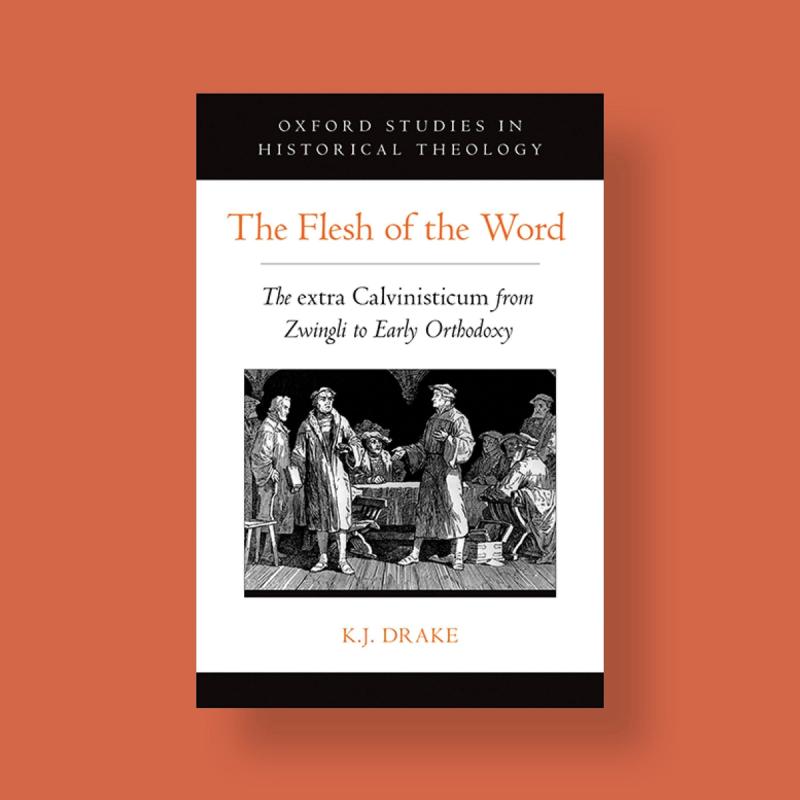***
Oxford University Press | 2021 | 336 pages (hardcover) | $99.00
We live in an age of rapid technological advancement. One could perhaps be forgiven for using the weary term “unprecedented” to describe it. The expanding abundance of easily accessible information about nearly everything has had a revolutionary impact on nearly everything, including the once crusted and stodgy field of historical theology. Armed with internet access and login credentials to a good academic library, today’s historical theologian need not fear a pandemic. Primary and secondary sources abound in digital form. It seems that just about every text from and about the past is accessible online. One result of this new academic world order is the proliferation of publications, not only about past theological minutiae but also about lesser-known theologians of the past. It sometimes seems like historical theology majors on mere trivia.
The extra Calvinisticum—the doctrine that the incarnate Son of God is not limited to his human nature—once seemed like a piece of historical-theological minutiae. In the twentieth century, there was an approximately fifty-year stretch in which the topic garnered precisely one scholarly monograph and two academic articles. In the last fifteen years alone, by contrast, the extra Calvinisticum has been the subject of four book-length studies and about a dozen academic articles and essays. The latest of these books is K. J. Drake’s The Flesh of the Word, appearing in Oxford’s Studies in Historical Theology series. Drake’s work is the fruit of careful research into early modern christological debates, and also undoubtedly of the readily available digital sources related to those debates. Whether the extra Calvinisticum is really a point of theological minutiae, however, gets to the heart of Drake’s concern in this book.
Previous studies of the extra generally fall into one of two groups: those that mine Calvin’s articulation and use of the doctrine, and those that survey the breadth of the Christian tradition for appearances of it. In contrast to both approaches, Drake drills down into sources from the early Reformation era—especially the works of Ulrich Zwingli—and examines the doctrine as a flash point in christological disputes between the Reformed and the Lutherans. Drake contends that the extra Calvinisticum was not a point of mere theological minutiae, nor even a sideline issue in the Reformed and Lutheran christological debates of the sixteenth century, but rather that “it was the crux of both the eucharistic debate and christological debates” between these traditions (11). In this endeavor, Zwingli is Drake’s touchstone, which serves to reorient the historical discussion away from Calvin and to make sure the “Calvin against the Calvinists” historiography of the nineteenth and twentieth centuries remains mostly dead.
As Drake affirms, scholars have long noted that the doctrine known by the unusual name extra Calvinisticum (the “Calvinistic extra” or “Calvinistic addition”) originally was neither Calvinist nor an addition. The doctrine is catholic, and its basic form is clearly articulated in the works of patristic, medieval, and Reformation theologians—Lutherans excepted. The basic form of the doctrine is that “the human nature of Christ does not confine the divine nature nor expand to its metaphysical dimensions” (203). Put positively, the person of Christ exists beyond (extra) his human nature even while incarnate and even after his ascension. As the fifth-century theologian Cyril of Alexandria vividly remarked in a letter to Nestorius,
The flesh [of the Word] was not changed into the nature of Godhead and . . . neither was the inexpressible nature of God the Word converted into the nature of flesh. . . . [E]ven when a baby seen in swaddling clothes at the bosom of the Virgin who bore him, he still filled the whole creation as God. (Letter 17, Wickham ed.)
Definitions are important in any argument, and this is especially the case in Drake’s argument that the extra was central to the sixteenth-century eucharistic and christological debates. He notes that the basic form of the doctrine, as articulated above and as found in patristic and medieval sources, “seems to stand on its own without further explication” (203). That is, the basic doctrine is not bound to the Reformation and post-Reformation christological conflicts. Drake’s argument about the centrality of the extra, however, is based on an expanded definition, which he draws from Calvin’s Institutes and the Heidelberg Catechism, and which includes a Reformed notion of the communicatio idiomatum—namely, that the properties of the divine and human natures in Christ are attributed to Christ’s person and not transferred between the natures (14–16). We should be quick to note that there is nothing wrong per se with using this expanded definition of the extra, particularly since Drake develops it from the sixteenth-century sources themselves. And yet such an expansive definition—with robust, built-in accounts of the hypostatic union and the communicatio idiomatum—perhaps contributes to an equally expansive account of the extra’s place in the interconfessional debates. To put it another way, if the doctrine of the extra Calvinisticum is as broad as the traditional definition of the hypostatic union, then the extra shows up almost every time Christology is discussed. To be clear, Drake does not see the extra everywhere, but there are moments when phrases like “Chalcedonian logic” and “the logic of the extra” seem to be synonymous (240, 277, 278) and where treatments of the communicatio idiomatum and the ascension in, for example, Peter Martyr Vermigli, are considered to be expressions of the doctrine of the extra when instead one might say that Vermigli is simply expounding the doctrine of incarnation. Such definitional challenges are not unique to Drake’s work. They are, in fact, endemic to all studies of the extra Calvinisticum, including my own.
Quibbles over definitions aside, Drake should be commended for two points in particular: his detailed exposition of sources in sixteenth-century Christology, and his repeated emphasis that the Reformed defense of the extra served to defend the true humanity of Christ and thus the gospel itself. Regarding the first point, arguably the most significant contribution of Drake’s study is the attention he gives to Zwingli, whom Drake credits with being “the first theologian in the Reformation to articulate the extra Calvinisticum” (19). Hence, Drake reorients the historical discussion of the extra toward Zwingli as a Reformed theologian in his own right and as the fountainhead of Reformed christological emphases and polemics. The exposition of Zwingli’s Christology also serves the second point: the Reformed saw the extra as protecting the gospel by protecting the doctrine of Christ’s true humanity, specifically against Lutheran claims that the hypostatic union resulted in the omnipresence, multivolipresence, or ubiquity of Christ’s body. Thus Drake concludes, “The deepest theological motivation of the extra is soteriological since it secures the distinctive qualities of both the human and the divine natures of Christ, which Zwingli understands as necessary for human salvation” (38). In effect, the extra is an expression of the ancient christological axiom that what Christ has not assumed is not healed. If Christ’s human nature partakes of the divine attribute of omnipresence, it ceases to be a true human nature like ours, and hence our human nature, which is persistently localized in one place, is not saved in the incarnation.
To give the Lutherans their due, Drake treats the reader to a thorough review of the original clash between Luther himself and the early Reformed theologians at the Marburg Colloquy of 1529. His review of the colloquy highlights one thing we already knew quite well: Luther was a man not easily persuaded to change his mind. Arising from Marburg is the picture of an exasperated Zwingli, who probably felt like banging his head on the table where Luther scrawled Hoc est corpus meum (“This is my body”), his central prooftext for ubiquity. More significant, however, is Drake’s conclusion that Marburg revealed divergent understandings of the use of reason, the interpretation of Scripture, and divine power between these two main streams of Protestant thought.
The story really doesn’t change much in the decades after Marburg, as Drake demonstrates through his exploration of the more extensive and technical arguments of Vermigli and the unsung French Reformed theologian Antoine de Chandieu. While Vermigli has received a lot of attention in historical theology in recent decades, Chandieu still remains in the shadows. Drake’s exposition of Chandieu’s 1585 treatise on the true human nature of Christ brings the Reformed arguments for the extra into the era of early orthodoxy, and it fills out the historical picture of the extra, which, as Drake puts it, must be seen as developing in “dialectical relationship” with the Lutheran doctrine of ubiquity (203). Drake concludes his study by noting a few ways the Reformation controversy spilled into areas beyond Christology and eucharistic doctrine, and he suggests some ways the extra might lead us to deeper theological reflection in our day. In this regard, the theological import of Christ’s ascension deserves mention as one area that has suffered relative neglect in contemporary theology. As Drake notes, the extra might be a spur to consider Christ’s ascension in more depth (288).
In the end, The Flesh of the Word stands as the most significant study of the early modern Reformed account and development of the extra Calvinisticum. Drake succeeds in demonstrating that the extra is “not a piece of theological trivia” (285). Rather, it is a doctrine deserving of the detailed attention it has received in both the Reformation era and our own.
Andrew M. McGinnis (PhD, Calvin Theological Seminary) is a research fellow at the Junius Institute for Digital Reformation Research and the author of The Son of God beyond the Flesh: A Historical and Theological Study of the extra Calvinisticum (Bloomsbury T&T Clark, 2014).








